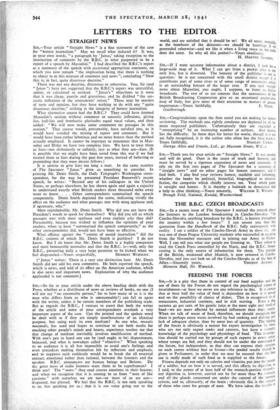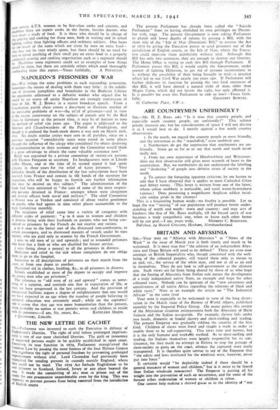FEEDING THE FORCES
SIR,—It is a pity that those in control of our food supplies and the use of them by the Forces do not regard the psychological aspect of nourishment—at least we never sec any reference to this. It is certain that at least half the value of food is dependent on how it is served and on the possibility of choice of dishes. This is recognised in all restaurants, industrial canteens, and in sick nursing. Even a dog secretes 4o per cent. of his gastric juice at the mere sight and smell of food—we are more affected by mental influences than dogs, surely. Wheri we talk of waste of food, therefore, we should recognise that there is perhaps more waste involved by bad cooking and dishing. and lack of adequate choice, than by mere loss of quantity. The feeding of the forces is obviously a matter for expert investigation by those who are not only expert cooks and caterers, but have a scientific knowledge of the psychology and physiology of food. This investiga- tion should be carried out by groups of such experts in every centre where troops are fed, and they should not be under the command of the forces, but independent, so that they can express their opinions on each centre without fear or favour—the pooled results should he given to Parliament, in order that we may be assured that the best use is really made of such food as is supplied to the forces. Fitness depends not only on calories and vitamins put into the mouth of a soldier, but on how it is served, and this affects its digestion. as I said, to the extent of at least half of the stomach-portion thereof— our digestion is, however, carried out by far more than the s:omacii+ and all the glands concerned are under the control of the nervegls system, and so, ultimately, of the brain ; obviously this is the concern of those who cater for groups of men. We have taken the trouh:e :0 min certain A.T.S. women to he first-class cooks and caterers, and doubtless there are expert cooks in the forces, besides doctors who
have i
made a study of food. It is these who should be in charge of the catering and cooking for these men, both in waiting and in actual fighting, rather than fighting officers and ordinary soldiers. One hears far too much of the sums which are spent by men on extra food— they may not be very wisely spent, but there should be no need for men to spend anything of their small pay on extra food in a properly conducted catering and cooking organisation such as a regiment should he. Doubtless some regiments could act as examples of how things should be done, but there are certainly others which need thoroughly overhauling from this aspect.—Yours faithfully, A PHYSICIAN.































 Previous page
Previous page